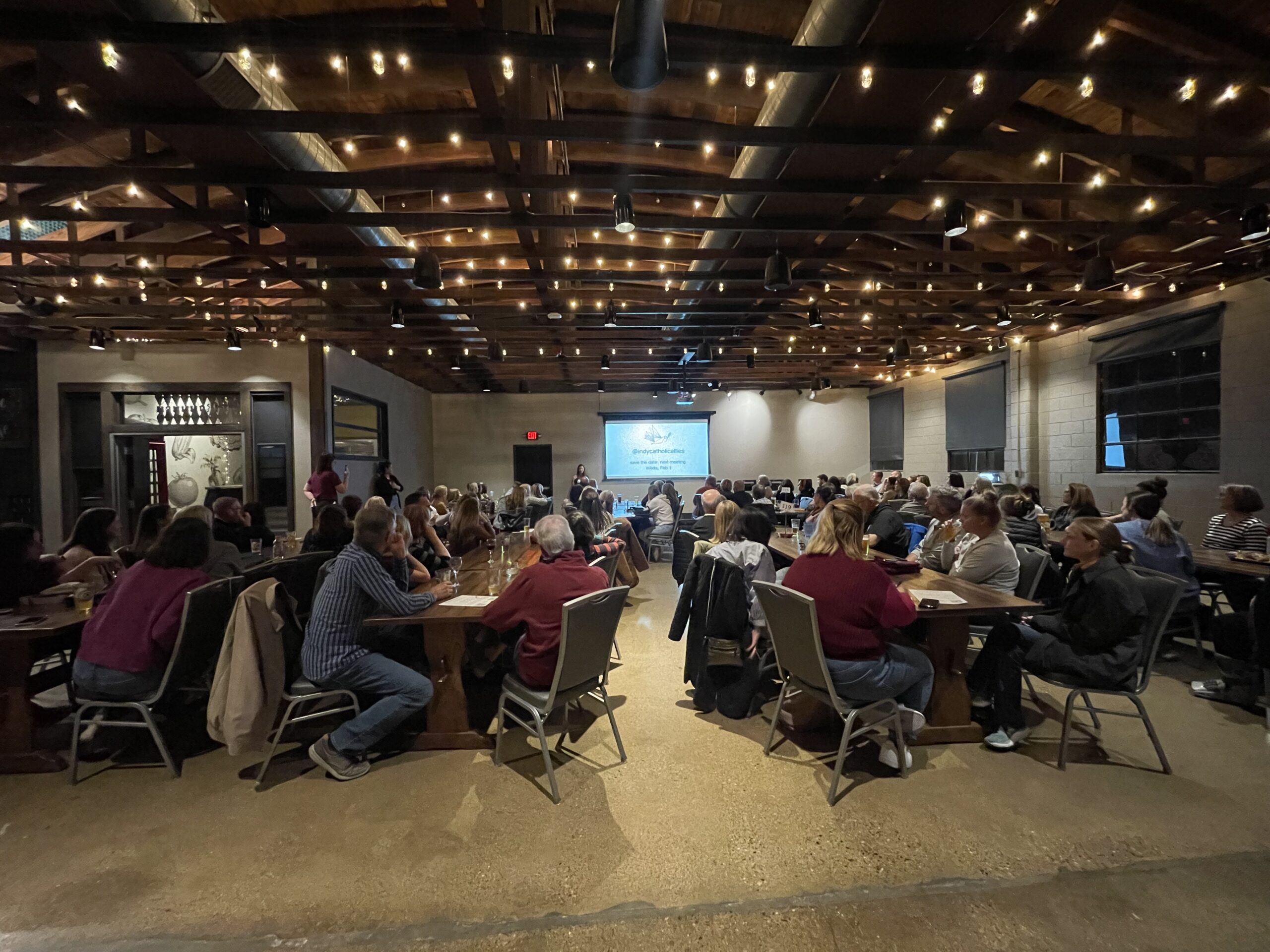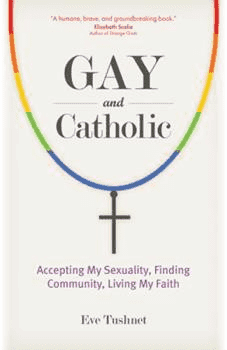After many conversations with fellow Catholic school friends in Indianapolis, we (that is, Danielle Wiese and Kate Berry) began Catholic Allies, a non-profit organization that seeks to foster a culture of loving support for LGBTQ people within our Catholic families. We seek to carve more affirming space for LGBTQ people—and especially youth—within our Catholic community.
Kate, Kristen Moorehead (an attorney) and I went to the same Catholic high school. As adults, a recurring theme at our book club became how to let LGBTQ young people know that they are loved beyond measure—and to prompt non-LGBTQ youth to practice allyship. But when parenting LGBTQ students in Catholic schools, this is especially tricky.
We felt that these conversations were often kept too quiet. And we thought there were likely other Catholics who felt the same way, but lacked the community to come together. What we envisioned as a small gathering ballooned into several meetings attended by more than 300 people. All of us grew up in Indianapolis Catholic schools and we have a wide network, so word traveled fast. Surprisingly, the meetings were all attended by supporters of LGBTQ youth. We had heard over and over again that people wanted conversations like these, and they were more than ready to give their time, money and energy to the cause.
What we envisioned as a small gathering ballooned into several meetings attended by more than 300 people.
Although our work is just beginning, here are some things we’ve learned along the way.
Five things Catholic adults want LGBTQ youth to know
- You are not alone. We see you, we hear you and you are important to us. Each day, more and more Catholics heed the call to elevate your needs and put an end to discrimination against you. We will not stop standing up for your dignity, safety and inclusion.
- If you are struggling, it will get better. Adults you can trust exist within our Catholic communities. Seek them, and let them find you. This may be hard, but many adults are waiting to support you.
- You are wonderfully made. You are most beautiful when you are the truest version of yourself. The poet E.E. Cummings wrote, “It takes courage to grow up and become who you really are.” We couldn’t agree more. God does not make mistakes.
- There is space at the Catholic table for you. It is not your duty to change who you are. It is the church’s duty to pull up a comfortable chair for you because we are all created in the image and likeness of God. It’s okay to find solace in the Catholic Church, despite its historical disconnect with the LGBTQ community. We want you here and we will continue to carve space for you. We understand if the Catholic Church doesn’t feel like a nurturing place for you, and we will continue to support you throughout your faith journey.
- You have tremendous innate value. Your value does not need to be earned. All of the qualities that make you uniquely yourself are gifts to our community. You are a child of God, and you deserve respect, compassion and sensitivity.
You are most beautiful when you are the truest version of yourself.
Five things LGBTQ youth want adults to know
- Accompany us. We just want to be heard. Just listen. Don’t offer advice unless asked, but it’s okay to ask us how you can help us best. You won’t get it all right and that’s okay. “I love you” is a good place to start.
- Show us we can ask you for help. Show you’re an ally so we know where to find you. Creating a space that is visibly welcoming is important. Display rainbow symbols or flags. Comment positively on us wearing pride symbols. Share your pronouns. The first time you share your pronouns may feel strange or unnecessary, but this simple act can be a beacon proclaiming that you are a safe person.
- Accept our truest selves. The Trevor Project states that “having at least one accepting adult can reduce the risk of a suicide attempt among LGBTQ young people by 40 [percent].” Accepting us for who we are and embracing our authentic selves will help us build confidence around our identities and fortify our self-esteem. Mental health matters. Your support in these moments of vulnerability will help affirm our self-worth and experiences.
- Make space at the Catholic table for us. The Catechism says that LGBTQ people “must be accepted with respect, compassion, and sensitivity. Every sign of unjust discrimination in their regard should be avoided.” Lean into this call. Be the person who makes everyone feel included. In order for our Catholic communities to flourish, we cannot limit the space at our table to select groups.
- Stand up for our inherent value and dignity. One of the most powerful tools you can use to show your allyship is inclusive language. Instead of saying “boyfriend” or “girlfriend,” use “crush.” If you hear a derogatory comment or slur towards the LGBTQ community, it may be easier to say nothing. But as Catholics we are called to take a risk in these situations. Step up, stand up and stop the hate.




I understand and appreciate Outreach’s efforts to improve things for LGBTQ Catholics, however it’s extremely frustrating to constantly hear we’re wonderfully made, we have tremendous innate value and we’re welcome at the table.
Until the church stops calling us intrinsically disordered and deeming our relationships as sinful all of those words of kindness and welcome ring hollow.
In addition to frustrating, I would go further and say I find the words of welcome psychologically abusive and untruthful to our LGBTQ youth. Until the church puts an end its “love the sinner, hate the sin” policy it’s clear LGBTQ youth and their allies will continue to leave the church in droves. Why would they want to be part of the church when that’s the real message?
My hope is that those who leave don’t leave god, but rather leave for denominations that truthfully honor and accept them for who they are and deem their relationships as sacred and holy.
Thank you these articles, Outreach. Some elderly folks like myself love our LGBQT grandchildren but are still learning. The term” crush” is a meaningful tidbit of advice. I am praying for dignity and true respect for all.